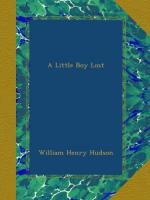In a few minutes the doe and fawn went away and they saw them no more; but they left Martin with a heart filled with happy excitement; and they were but the first of many strange and beautiful wild animals he was now made acquainted with, so that for days he could think of nothing else and wished for nothing better.
But one day when she had taken him a good way up on the hillside, Martin suddenly recognized a huge rocky precipice before him as the one up which she had taken him, and from the top of which he had seen the great blue water. Instantly he demanded to be taken up again, and when she refused he rebelled against her, and was first passionate and then sullen. Finding that he would not listen to anything she could say, she sat down on a rock and left him to himself. He could not climb up that precipice, and so he rambled away to some distance, thinking to hide himself from her, because he thought her unreasonable and unkind not to allow him to see the blue water once more. But presently he caught sight of a snake lying motionless on a bed of moss at the foot of a rock, with the sun on it, lighting up its polished scales so that they shone like gems or coloured glass. Resting his elbows on the stone and holding his face between his hands he fell to watching the snake, for though it seemed fast asleep in the sun its gem-like eyes were wide open.
All at once he felt his mother’s hand on his head: “Martin,” she said, “would you like to know what the snake feels when it lies with eyes open in the bright hot sun? Shall I make you feel just how he feels?”
“Yes,” said Martin eagerly, forgetting his quarrel with her; then taking him up in her strong arms she walked rapidly away, and brought him to that very spot where he had seen the doe and fawn.
She sat him down, and instantly his ears were filled with the murmur of the bees; and in a moment she put her hand in the crevice and pulled out a cluster of white cells, and gave them to Martin. Breaking one of the cells he saw that it was full of thick honey, of a violet colour, and tasting it he found it was like very sweet honey in which a little salt had been mixed. He liked it and he didn’t like it; still, it was not the same in all the cells; in some it was scarcely salt at all; and he began to suck the honey of cell after cell, trying to find one that was not salt; and by and by he dropped the cluster of cells from his hand, and stooping to pick it up forgot to do so, and laying his head down and stretching himself out on the mossy ground looked up into his mother’s face with drowsy, happy eyes. How sweet it seemed, lying there in the sun, with the sun shining right into his eyes, and filling his whole being with its delicious heat! He wished for nothing now—not even for the sight of new wonderful things; he forgot the blue water, the strange, beautiful wild animals, and his only thought, if he had a thought, was that it was very nice to lie there, not sleeping, but feeling the sun in him, and seeing it above him; and seeing all things—the blue sky, the grey rocks and green bushes and moss, and the woman in her green dress and her loose black hair—and hearing, too, the soft, low, continuous murmur of the yellow bees.




